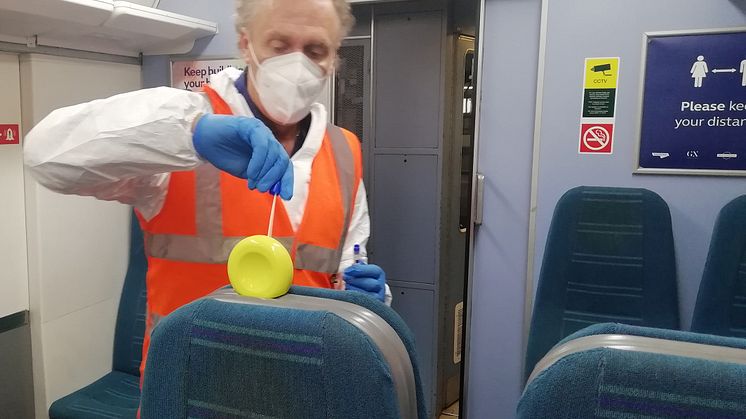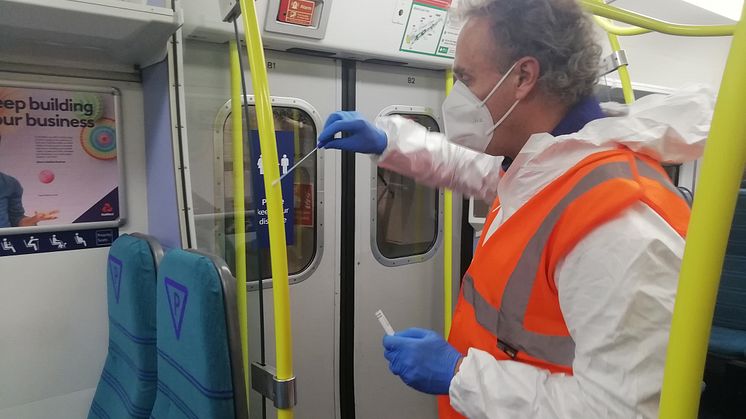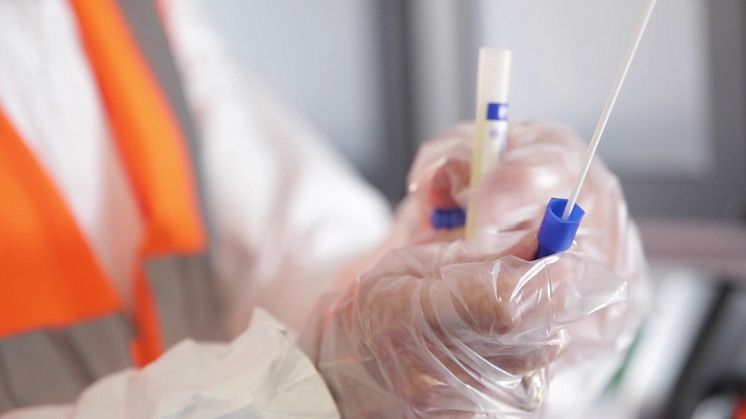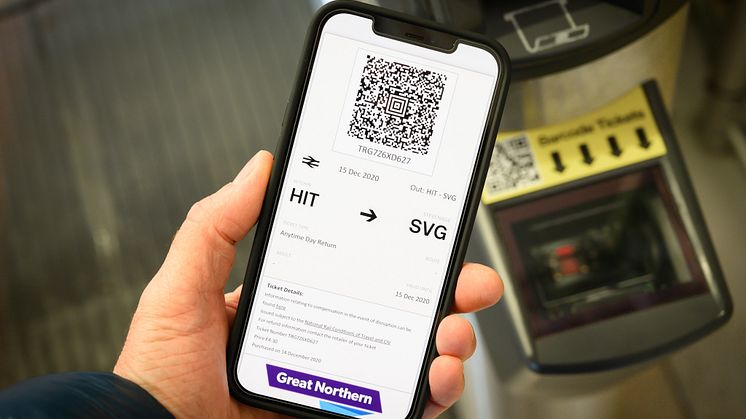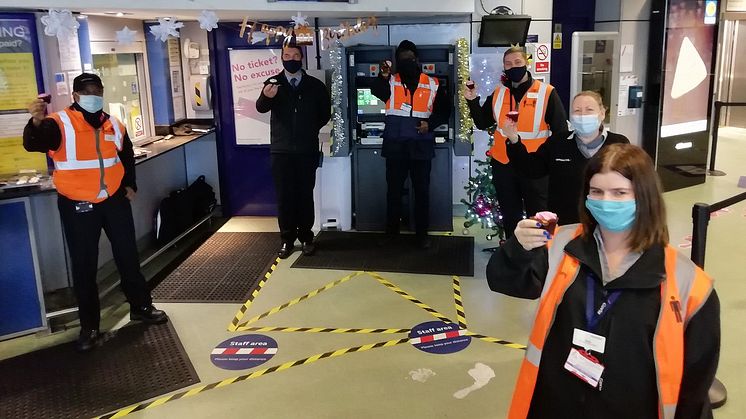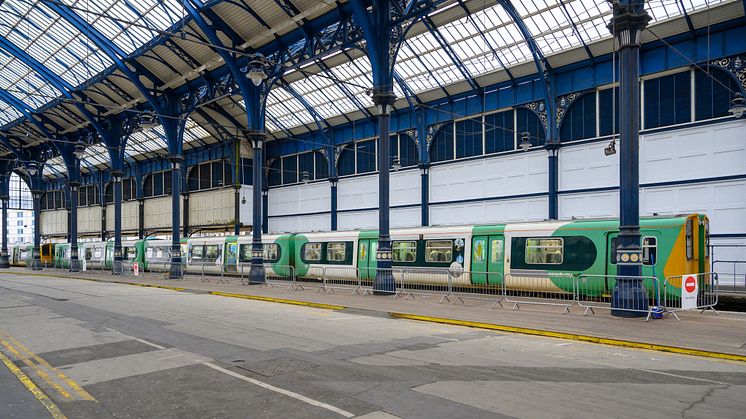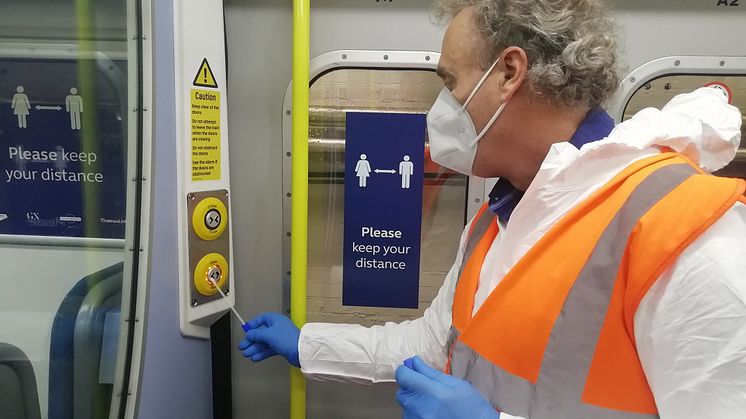
Press release -
Lab tests see Southern, Thameslink and Great Northern trains test negative for Covid
B-roll and further high resolution images available below
Independent laboratory results show that Southern, Thameslink and Great Northern trains are testing negative for Covid-19 over three weeks after being treated with a long-lasting viruscide.
Operator Govia Thameslink Railway (GTR) randomly selected carriages from all eight of its train fleets up to 23 days after carriages were treated with the long-lasting viruscide.
Swabs were then taken from areas in the train carriages frequently touched by passengers and staff – such as grab rails, tables, toilet handles, door buttons and the driver’s power-brake controllers which are in constant use.
The laboratory microbiological tests showed there was no presence of Covid-19on any of the surfaces tested.
Chief Operating Officer Steve White said: “We are carrying out a comprehensive testing regime of our trains to ensure that our customers can travel with confidence. Passengers can be reassured that the long-lasting viruscide we’re using, more than 100 extra cleaners and hospital-grade cleaning products are working. Please follow the government advice and wear a face covering.”
GTR, since the early days of the Covid-19 pandemic, has been using Adenosine Triphosphate (ATP) testing to prove that its intensive cleaning regime is working, keeping microorganisms at bay.
The long-lasting viruscide is part of a series of measures to keep passengers safe, that include, across trains and stations:
- 100 extra cleaning staff at work: 40,000 extra labour hours in three months to enhance the cleanliness of our stations, trains and staff areas.
- All 2,700 carriages across Thameslink, Great Northern, Southern and Gatwick Express are sanitised overnight using specially-procured short-term anti-viral sprays, with a focus on touchpoints
- New techniques – high-pressure dry steam and microfibre units are used for enhanced cleaning. Bleach fogging is used for decontamination where someone has been confirmed as having Covid-19
GTR continues to offer support and reassurance for passengers travelling during lockdown as identified in this press release.
ends
Notes to editors
The lab tests
Independent tests, commissioned by GTR towards the start of the pandemic, had already shown that the long-lasting viruscide that is in use continued to kill coronavirus applied in a laboratory setting, 28 days after the viruscide had been applied.
These latest independent lab tests confirm specifically that Covid-19 has not been found on surfaces in carriages selected at random from each of GTR’s nine train fleets, up to 23 days after they were treated with the long-lasting viruscide (23 days was the longest any one of the trains tested had been in service since the long-lasing viruscide had been applied; the viruscide has been shown to kill coronavirus for even longer - see above).
Scientists in the latest set of lab tests also searched for the pathogens Staphylococcus Aureus (which can cause pneumonia, food poisoning and skin infections), and E Coli (which can give rise to food poisoning). Both are very common, carried on people’s hands, and persistent on hard surfaces. They found only negligible, entirely safe, levels – even on toilet door handles.
Other tests
GTR, since the early days of the Covid-19 pandemic, has been using Adenosine Triphosphate (ATP) testing to prove that its intensive cleaning regime and long-lasting viruscide, are working, keeping microorganisms at bay.
While ATP cannot specifically test for coronavirus including Covid-19, it can measure levels of surface contamination by microorganisms. When levels are low, it is highly unlikely that Covid-19 is present.
The long-lasting viruscide is part of a series of measures to keep passengers safe, that include:
- More than 100 extra cleaning staff at work: 40,000 extra labour hours in three months to enhance the cleanliness of our stations, trains and staff areas.
- All 2,700 carriages across Thameslink, Great Northern, Southern and Gatwick Express are sanitised overnight using specially-procured short-term anti-viral sprays, with a focus on touchpoints
- New techniques – high-pressure dry steam and microfibre units are used for enhanced cleaning. Bleach fogging is used for decontamination where someone has been confirmed as having Covid-19
Topics
Categories
Govia Thameslink Railway
Govia Thameslink Railway (GTR) operates Thameslink, Great Northern, Southern and Gatwick Express services as follows:
- Thameslink – cross-London services between Bedford/Peterborough/Cambridge and Brighton/Horsham/Littlehampton/East Grinstead, and between Luton/St Albans and Sutton/Wimbledon/Rainham; plus services between London and Sevenoaks
- Great Northern – services between London and Welwyn, Hertford, Peterborough, Cambridge and King’s Lynn
- Southern – services between London and the Sussex coast (Brighton, Worthing, Eastbourne, Bognor Regis, Hastings) and parts of Surrey, Kent and Hampshire (Ashford International, Southampton, Portsmouth)
- Gatwick Express – fast, non-stop direct services between Gatwick Airport and London Victoria
www.southernrailway.com, www.thameslinkrailway.com, www.gatwickexpress.com, www.greatnorthernrail.com


